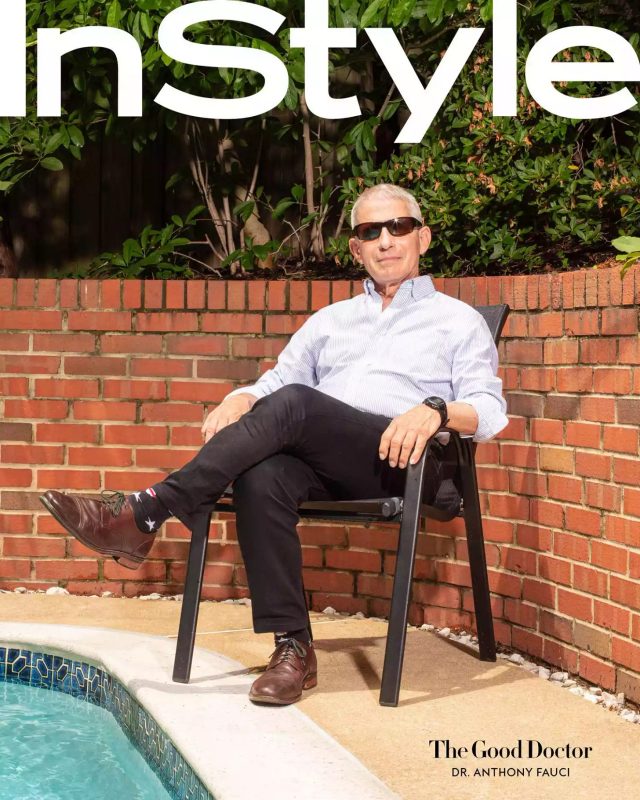Norah O’Donnell has known Dr. Fauci and his wife for ages: “How are you guys?” she starts her interview with Dr. Fauci for InStyle Magazine where Fauci posed for the most hubris-exuding photo of the pandemic.
“With all due modesty, I think I’m pretty effective!” – Dr. Anthony Fauci, July 2020, InStyle Magazine
This was 3 years ago this past week:


Norah’s husband, Chef Geoff, owns the Georgetown restaurant, “Deluxe Hospitality” She admits in her opening that Dr. Fauci and his wife, the bioethicist, Dr. Christine Grady, are frequent patrons there.
“… these days mostly for takeout.” O’Donnell chuckles.
Revisiting this horrible puff piece you can’t help but see the obtuseness of the leader of the pandemic policy in stark relief.
First, as always, the man is incapable of actual reflection:
NO: What have we done wrong?
A F: You know, that’s almost an unanswerable question. There are so many possibilities. I don’t like to phrase it in the context of what we’ve done wrong, as opposed to let’s take a look at what happened and maybe we can have lessons learned.
Showing once again that Dr. Fauci (in July 2020) believed that we did NOT lock down hard enough:
If you look at the European countries, they shut down about 90 to 95 percent of the country. Whereas when we shut down, the calculation is that we shut down about 50 percent. So, put all of those factors together, I can’t say we did anything wrong, you know, but certainly we’ve got to do better.
Lambasting any move to “re-open” he continues: “What we need to do now is to learn the lesson of what happened with the recent surges. We’ve got to pause in the opening and maybe even take a step back in our phases…”
Pushing masks was a high priority for the man who months earlier admitted in an email that they don’t really do anything:
As we try to proceed, we need to really take seriously the issue of wearing masks all the time and not congregating in bars. I think we can stop that by just closing them, because they are certainly an important mechanism of this spread. Keep distances, wash hands, avoid crowds, wear a mask … I think if we diligently do those things, we can turn this around.
Norah asks him about the “noble lie” he told around masks (which is just ridiculous parsing):
NO: It’s been recently reminded to us by the White House that you advised against people wearing masks in public, and, of course, that was due to the surge because the concern was about saving PPEs for medical professionals. Do you regret that comment?
A F: No. I don’t regret anything I said then because in the context of the time in which I said it, it was correct.
I’m always struck as to the casual and flippant manner in which Dr. Fauci proscribed the policies. Here he is continuing to defend his noble lie and pushing masks with assertions that STILL have no science behind them – in fact, quite the opposite.
And also, it soon became clear that we had enough protective equipment and that cloth masks and homemade masks were as good as masks that you would buy from surgical supply stores.
The plan to vaccinate millions was already in place as this comments affirms:
By the beginning of the year we should have the first tens of millions and then hundreds of millions of doses. That being the case, I would think we could vaccinate a substantial portion of the population as we get into 2021 — if the vaccine is safe and effective.
The the hubris really kicks in:
NO: And how long do you see yourself at the NIAID?
A F: I don’t see any termination within the near future because I judge [my career] by my energy and my effectiveness. And right now, with all due modesty, I think I’m pretty effective.
Norah turns to Mrs. Fauci (Dr. Grady):
NO: Let me ask you, Chris, as a bioethicist, what do you make of this moment we’re in, when even a mask has become more of a divisive issue?
CG: Well, I would say that masks shouldn’t be divisive. It’s a relatively easy way to protect one’s self and others. And so for public health reasons, I think everybody should do it. From an ethical perspective there is always this tension between what you ask people to do that feels like a restriction of their liberty and what is required for public health. And in this case, it seems like a slam dunk. It’s not restricting liberty much, and it’s very helpful for public health.
She goes on to lament how “unfair” it all seems to her:
when he gets criticized, it feels unfair to me because he is working so hard for the right reasons.
NO: What feels unfair?
CG: That people are looking for things to criticize — I mean, for anything. They are making things up. They are not putting into perspective the contribution that he is making.
A curious aside, Dr. Fauci and Dr. Grady’s first encounter began with a lie – seems kind of appropriate if you’ll forgive my commentary on that.
CG: [laughs] I had just come back from spending two years with Project Hope in Brazil and came to work at the NIH. There was a patient, Pedro, on the unit at the time who was Brazilian and didn’t speak English. One day he asked me if I could speak to his doctors about sending him home because he really wanted to go home. So I set up a meeting with the fellows who were taking care of him and Tony, who was the attending physician. I had not met Tony before that. I was the interpreter. And Tony told him, “He may go home and be very careful about taking care of his health and doing his dressings and sitting with his leg up and things like that.” And when I told him that, Pedro said, “There’s no way I’m doing that. I’ve been in the hospital for months. I’m going to the beach, and I’m going dancing at night.” And I sort of in a split second decided to tell Tony, “He said he’d do exactly what you said.”
AF: She lied! [laughs]
CG: I lied! So the next day I was walking down the hall, and Dr. Fauci came by and said, “Can I see you in my office at the end of the day?” I thought I was going to get fired. But he asked me out to dinner. [laughs]
The entire hagiographical interview in hindsight is a classic look at the elitist bubble around the people in Washington, D.C. during the pandemic. Dr. Fauci’s contribution to history will not be seen in a kind light.
Reprinted from Rational Ground
Join the conversation:


Published under a Creative Commons Attribution 4.0 International License
For reprints, please set the canonical link back to the original Brownstone Institute Article and Author.









